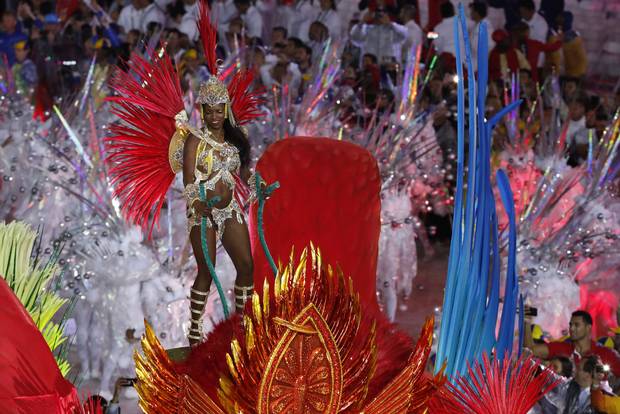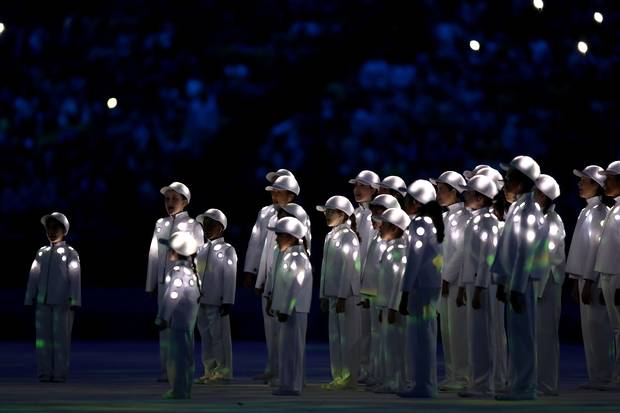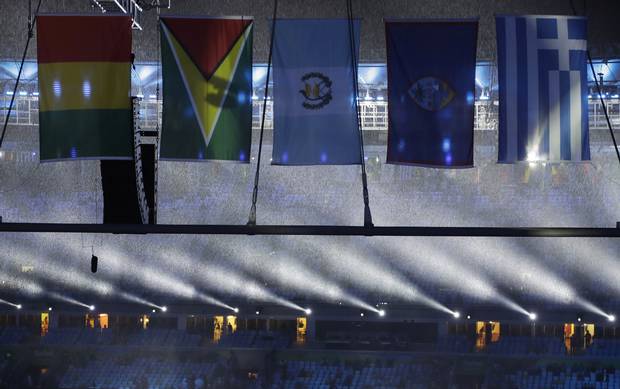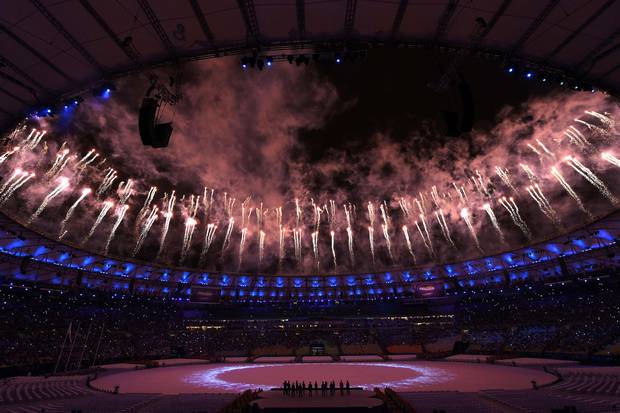Highlights:
- Penny Oleksiak was Canada’s flag bearer in a ceremony that celebrated Brazilian history, art and culture
- Canada had a reasonably successful Olympic Games, especially in comparison to many of the big names in Rio, Cathal Kelly writes
- The success of Andre De Grasse and Penny Oleksiak in Rio has boosted Team Canada’s optimism for the Tokyo 2020 Olympics
- After the Olympic flame has been doused and the circus has left town, Brazilians will question whether it was all worth it, Gary Mason writes
The closing ceremony: A recap
A nod to the next Olympic games: Tokyo 2020
Everyone knew that Shinzo Abe, the prime minister of Japan, was headed to Rio to represent the country that will host the 2020 Summer Olympics. But viewers who tuned into the broadcast of Rio's closing ceremony on Monday morning Japan time were surprised to see their normally sober leader pop out of an oversized green drainpipe dressed as Super Mario, the character from the popular Nintendo video game.
Abe's appearance followed a glossy promotional video showing athletes in stereotypical scenes from Tokyo, as well as various characters from popular culture, including Hello Kitty and Doraemon. The scene cut to Abe in a taxi, fretting that he wouldn't make it to Rio on time, followed by an animated Super Mario diving into a green pipe in Tokyo, emerging as a human figure from the green pipe on the field in Rio de Janeiro. When his costume fell off, the prime minister emerged, holding a red ball and waving a red cap, a shadow of a smile on his face.
Japanese Prime Minister Shinzo Abe holds a red ball during the closing ceremony of the Rio 2016 Olympic Games at the Maracana stadium in Rio de Janeiro on August 21, 2016.
PHILIPPE LOPEZ/AFP/Getty Images
Closing out the celebration: a recreation of the best of Rio's Carnaval blocos
There were 12 different parade queens dancing, some 200 dancers, and 50 of the older women in traditional dress from Bahia who are the bedrock of the samba schools and the parades. And Renata Sorriso — a garbage collector who got famous for his dance steps when he swept up at the end of the parade competition in the Sambadromo. The Rio2016 organizers took him to London 2012 to be part of the handover.

Dancers perform during the closing ceremony for the Summer Olympics in Rio de Janeiro, Brazil, on August 21, 2016.
Vincent Thian/AP Photo
The last athletes were being ushered out as Maracanã fills with glittery confetti and the smoke from fireworks — but some appeared to have gone rogue and plunged into the dancing throng. What could be more Rio.
The ceremony honours landscape artist Roberto Burle-Marx
This section of the ceremony was inspired by, and was a tribute to, Roberto Burle-Marx, another figure who is hugely important to Brazilians and little known outside the country. A modernist landscape artist, he designed lush, sinuous parks and public spaces that used native species and big sections of the same plant.
Burle-Marx worked all over the world but Rio, where he had a sprawling farm at the edge of the city, is sometimes called an open-air museum to his work. He designed the iconic undulating black-and-white stone orla, or beachfront sidewalk of Copacabana. He died in 1994 at 84.
Performers take part in the closing ceremony in a tribute to Roberto Burle-Marx, a modernist landscape artist.
Vasily Fedosenko/REUTERS
A tribute to Brazil's indigenous history
This section of the closing ceremony paid tribute to the "art of the people", and it started with the cave art of the first South Americans. There's a shout-out here to an extraordinary Brazilian pioneer, the archaeologist Niede Guidon, who at 83 continueds to excavate in the northern state of Piaui. Guidon dates human settlement in the region to 32,000 years ago, tens of thousands of years older than the conventional archaeological thinking. She has identified more than 800 sites in what is now Serra da Capivara National Park.

A Guarani children’s choir sings on stage during the Closing Ceremony on Day 16 of the Rio 2016 Olympic Games at Maracana Stadium on August 21, 2016 in Rio de Janeiro, Brazil.
Ezra Shaw/Getty Images
The music was a song by a choir of Guarani children, from one of the indigenous groups who lived here in Rio when the Portuguese arrived 500 years ago.
What music are they playing?
For anyone looking for a crash course in Brazilian music styles: the athletes were serenaded with frevo, which comes from the northeastern state of Pernambuco. It's danced in an insanely fast series of steps and twirls, playful footwork that Brazilians call gingado. The name frevo is a corruption of the verb ferver, to boil. The music originated in the late 19th century and it fuses songs from capoeira and maxixie, another Afro-descendant music style. The legendary street Carnaval party in the colonial city of Olinda is built around dancing to fervo in the narrow streets.
Dancers perform during the closing ceremony of the Rio 2016 Olympic Games at the Maracana stadium in Rio de Janeiro on August 21, 2016.
ERIC FEFERBERG/AFP/Getty Images
The party’s theme: the Carnaval celebration
The party in the Maracanã tonight for the Rio Olympics closing ceremony was modeled on the Cordão do Bola Preta, the oldest and the most popular of the
blocos, or street parades, in the city’s annual Carnaval celebration. Bola Preta was first staged in 1918, and last year more than a million people took part. The blocos always have a theme, are led by a band, and parade through a particular part of the city — Bola Preta goes through the old centre.
Closing ceremony kicks off with fireworks
0:21
The name is said to originate with the founder, Alvaro Gomes de Oliveira, known as Caveirinha, who, so they say, saw a beautiful woman wearing a black and white spotted dress passing by and decided to name it for her polkadots, or
bolas. Since then, black and white spotted costumes are the official outfit for this bloco.
Rio breathes a sigh of relief
Rio felt like a host standing in the driveway waving farewell at the end of a long visit from dear friends. You’re awfully glad they came, you had a lovely time, and as they drive off, you slam the door and slump against it in relief: everyone had a terrific time, there were no embarrassing disasters, and now they’re gone. You can tackle the heap of dirty dishes and get back to normal life. Next time it’ll be someone else’s turn to host.
Volunteers hold flags of different countries at the Closing Ceremony in Rio, including Malaysia and Turkey.
Yves Herman/REUTERS
Rain and high winds in Rio before closing ceremonies begin
With a bit less than an hour to go before the closing ceremony in Rio, there was no let up in a winter storm that blew up in the late afternoon (Yes, winter. These might be the Summer Games, but not even the International Olympic Committee can change the seasons of the southern hemisphere.)
Winds were clocked at 90 kilometres per hour outside the stadium. The crowd that filtered in is more-or-less protected by a roof, but the centre of Rio's storied Maracanã stadium is open to the sky, and wet.
There was also be a portion of the ceremony devoted to Tokyo, which will host the next games in 2020.
——
Posts by Stephanie Nolen

Rain falls in Maracana Stadium before the closing ceremony of the 2016 Summer Olympics in Rio de Janeiro, Brazil, Sunday, Aug. 21, 2016.
Chris Carlson/AP Photo
Views from the Canadian delegation
‘Brb gotta go wave this flag’: Canadian athletes celebrate Rio closing ceremony
0:55
On a blustery and rainy night, Oleksiak carried the Maple Leaf and led a Canadian contingent that surpassed its goal in Rio of finishing in the top 12 in the overall medal count.
The rest of the athletes followed the flag-bearers, with the Canadians wearing their trademark red mittens. Despite the poor weather, the athletes seemed to be in a festive mood and ready to let off steam.
A walk to remember! #ClosingCeremony #Rio2016 #TeamCanada pic.twitter.com/x2tvf8Ar5N
— Sekou Kaba (@sekou_kaba) August 22, 2016
And the Canadian athletes deserved to. Canada earned 22 medals — four better than the 18 won in London four years ago — and was 10th in the medal standings.
"I'm super honoured just to be able to carry the flag for Canada and lead all these athletes who've worked so hard to get here," said Oleksiak, a 16-year-old native of Toronto.
Athletes from Canada march in during the closing ceremony in the Maracana stadium at the 2016 Summer Olympics in Rio de Janeiro, Brazil, Sunday, Aug. 21, 2016.
David Goldman/AP Photo
Team Canada gets ready
Canadian athletes shared photos of themselves wearing Team Canada mittens to stay warm as they prepared to attend the closing ceremony.
Canada is prepared for a chilly closing ceremonies in Rio! Excited to have the whole team lead by @OleksiakPenny 🇨🇦💨 pic.twitter.com/PgqgQQCRRg
— Brittany MacLean (@b_maclean) August 21, 2016
We got mittens!!!!!! Yeahhhhhhh!!!! pic.twitter.com/2hanFBYin5
— Lizanne Murphy (@LizzieMurph) August 21, 2016
WHAT HAPPENED ON DAY 16
Wrestling
One of the more bizarre moments of these Olympics occurred at the end of the bronze medal match in the men's 65-kg weight class. A last-minute penalty charged to Mongolian wrestler Mandakhnaran Ganzorig swung the outcome of his third-place contest against Uzbek Ikhtiyor Navruzov, costing the Mongolian a medal.
The reaction from his coaches was unbelievable. Two men from Ganzorig's team stripped down – one to his underwear – protest the match's outcome. The whole saga lasted several minutes.
The coach of Mandakhnaran Ganzorig of Mongolia takes off his clothes as he protests after the match against Ikhtiyor Navruzov of Uzbekistan.
TORU HANAI/REUTERS
The United States men's basketball team pounded Serbia 96-66 to claim a third straight Olympic gold medal.
The team had been unsettled earlier by how close many of their games had been. One of their tightest games was a 94-91 win over Serbia in the preliminary round. But the U.S. quickly removed any suspense from the rematch on Sunday, surging to a 52-29 lead by halftime.
Nemanja Nedovic of Serbia and Demarcus Cousins of the USA compete. The U.S. routed Serbia 96-66 to win a third straight gold medal in men’s basketball.
Jim Young/Reuters
Mountain Bike
All-time Canadian Cycling medals
Prior to Rio, Canada had won 12 medals in cycling events. Select a medal for more details.
Data: Sports-reference.com
Raphael Gagne and Leandre Bouchard represented Canada in the men's mountain bike competition. Gagne, from Quebec City, is coming off a gold medal at the 2015 Commonwealth Games. Bouchard is a three-time Canadian under-23 champion. Swiss cyclist Nino Schurter won gold.
Yesterday, Catharine Pendrel took bronze in the women's final, finishing seconds ahead of her teammate Emily Batty. It's redemption for Pendrel, who fell well short of expectations when she finished off the podium at the 2012 Summer Olympics in London.
Marathon
The athletics competition wrapped up in Rio with the men's marathon. Kenya's Eliud Kipchoge won gold in a time of two hours, eight minutes and 44 seconds. The 42.195-kilometre race featured a stacked field headlined by defending champion Stephen Kiprotich of Uganda.
Canada was represented by Hamilton's Reid Coolsaet and Eric Gillis of Antigonish, N.S. Gillis finished in 10th.
IN CASE YOU MISSED IT
- Day 1: Canada wins its first medal of the Rio Games
- Day 2: Canada wins a silver in women’s butterfly
- Day 3: Women’s rugby sevens earns bronze for Canada
- Day 4: Canada takes bronze in 10m synchro dive
- Day 5: Canada picks up sixth medal in women’s freestyle relay
- Day 6: Oleksiak wins Canada’s first gold medal of Rio 2016
- Day 7: Canada’s Rosie MacLennan takes home gold in trampoline
- Day 8: Theisen-Eaton wins bronze in heptathlon, De Grasse wins heat
- Day 9: Bolt wins gold, De Grasse takes bronze in the 100 metres final
- Day 10: Canadian Shawn Barber eliminated from pole vault in early exit
- Day 11: Derek Drouin wins gold in men’s high jump
- Day 12: De Grasse advances to men’s 200-metre final
- Day 13: De Grasse takes silver in 200 metres; Bolt wins again
- Day 14: Team Canada takes bronze in relay, Bolt makes history with triple-triple
- Day 15: Brazil defeats Germany to win gold in men’s soccer final
FOLLOW THE GLOBE IN RIO
- Meet the reporters on the ground during the games
- Follow us on Twitter, Facebook and Instagram
With files from New York Times, Reuters, The Canadian Press and Globe staff.
